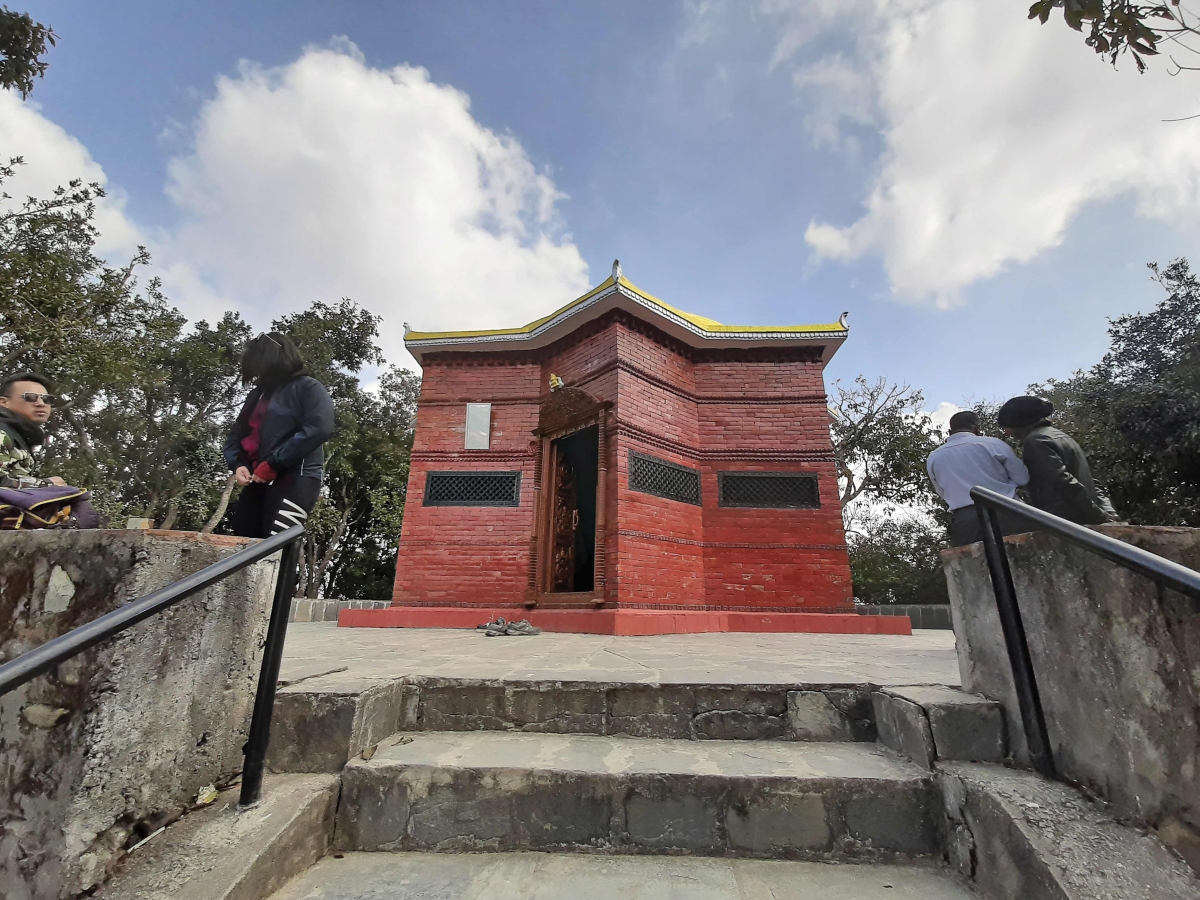Several years ago I was gathering information on Mount Everest and the incredible number of expeditions that have attempted climbing the colossal peak. Someone suggested, "Why don't you talk to Liz Hawley? She knows all about it and keeps meticulous records of all the climbers and expeditions." I did call since nobody else seemed to have a clue as to how many had scaled the world's highest peak. Without a moment's hesitation Miss Hawley's clear voice on the phone told me, "808 people have made 1052 ascents. What else do you want to know?" A little stunned, all I could muster was, "Thank you so much, ma'am."
Four years later, I found myself at her office/residence at Dilli Bazaar with an appointment to meet the remarkable Miss Hawley. As I was settling down on her office sofa, she said, "You're on time. In fact you are two minutes early." That's another record she'll probably store in her sharp mind among the countless figures and dates she has at her fingertips.
Elizabeth Ann Hawley was born in Chicago in what is known as the roaring twenties: on the 9th of November 1923 to be precise. She came into the world during the time of prohibition in America, when jazz bands were all the rage in the dance halls of Chicago.
Elizabeth Hawley first arrived in Nepal in February 1958 to a changing nation. The forbidden kingdom was tentatively opening to the west, allowing in a select few. The early visitors were diplomats, missionaries, aid officials, a few tourists and journalists. As Miss Hawley recalls, "It was an interesting time." Trained as an historian, she had worked for Fortune magazine in the U.S. as a researcher/reporter. After quitting that job, she flew to Nepal via India and on the behest of the Time-Life Bureau Chief in New Delhi, she sent reports to him from Kathmandu. Her assignment: to report on the historic events taking place in the capital of Nepal. On the 12th of February 1959, along with a handful of journalists, Miss Hawley was present at Hanuman Dhoka when King Mahendra handed over the first constitution to General Subarna Shumshere Rana, who was the chairman of the King's council of advisors. The constitution paved the way for general elections, which would introduce democracy in Nepal for the first time.
In September 1960, Miss Hawley returned to Nepal and took up residence at Dilli Bazaar where forty-three years later she still resides. At the time she was accredited as Time-Life's part-time correspondent in Nepal. Two years later she began reporting for Reuters News Agency. As part of her job, she began to report on mountaineering activities, and in the spring of 1963 began meeting every expedition that came to climb in the Nepal Himalaya. When Tibet opened up again to climbers, she started meeting even those who came to attempt the mountains from the north side.
Today Miss Hawley is the mountaineering correspondent for Reuters News Agency, American Alpine Journal, Himalayan Journal (India), Alp (Italy), Climber (UK), Desnivel (Spain), Die Alpen (Switzerland), Vertical (France), Yama-Kei (Japan) and Alpinist (USA). Aside from her busy schedule of meeting people and reporting, she is also the honorary Consul of New Zealand and Executive Officer of Sir Edmund Hillary's aid organization 'The Himalayan Trust', which has its office below her flat. She is also a consultant to Mountain Travel Nepal and its Tiger Mountain Group of adventure travel companies. At the age of 79, she seems comfortable with her busy schedule, remembering both historic dates and her numerous appointments with ease.
Looking back on the 1960's, Liz Hawley recalls a time when there were few cars in the valley and even fewer motorcycles. It was a time when there were no streetlights and few shops where one could buy provisions. The place to buy crockery, cutlery and stationary was at Mercantile's in New Road while the Blue Bucket in Juddha Sadak (road to Indra Chowk) sold tinned food and packaged goods. As she rode about town in her bicycle she would see the Nepalese men all in their daura suruwal while almost all the womenfolk remained strictly indoors. The children would call after her "Anglesi! Anglesi!" She recalls how Putali Sadak ended at Kamaladi with no connecting road to where Krishna Pauroti is today. During her four decades in Nepal, she has witnessed an enormous growth of the middle class.
When asked about the Royal Hotel, Miss Hawley fondly remembers Boris, the Russian proprietor as a charming man who had endless stories to tell. She remembers Father Moran who arrived in 1950 to open what was to become St. Xavier's School. He occasionally visited the Royal on his motorbike and having a keen interest in mountaineering, kept in touch with mountaineers all over the world through his HAM radio. She remembers Tony Hagen, who also arrived in 1950, as a talkative person and Peter Aufschnaiter, one of the leading characters in Heinrich Harrer's autobiography "Seven Years In Tibet" as a shy, quiet person who became a Nepali citizen. The other famous personality she met was the small-built Field Marshall Kaiser Shumshere J.B. Rana, whose huge collection of books remains in the Kaiser Library today. Miss Hawley remembers the Field Marshall as a man with a sharp mind and knowledgeable on a vast range of subjects. She talks of Michel Peisel, the Frenchman who wrote 'Tiger for Breakfast' (a biography on Boris), and how he falsely claimed to be the first foreigner to have visited Mustang. "Barbara Adams was there with Prince Basundhara before him," she says indignantly. She points out Desmond Doig's drawing of her at the office. She seems to have known him well.
Although she has never climbed a mountain, Miss Hawley is the undisputed, unofficial authority on mountaineering. Tracking down the expeditions through their trekking agencies, she meets up with the leading climbers and expedition leaders in their hotels before and after their climb. She obtains all the details about their plans, expedition members, the route up the mountain, etc. On their return, she painstakingly notes every detail of the events on the mountain including the height reached and any untoward incidents. She lets us in on a little secret. One wonders how she meets the climbers attempting the route from the north in Tibet. She explains "99% of those climbing from the north go through Nepal." Faced with too many expeditions arriving in Nepal these days, she sends her assistants to meet some of them.
With a mountain of statistics and other information on mountaineering at her disposal, it was only a matter of time before Miss Hawley came up with a book. A book containing all of her data, together with totally new statistical analysis of trends in climbing in the Nepal Himalaya is being prepared partly here, while the rest of the work is being carried out in Michigan, USA. This will undoubtedly be the most detailed book on climbing in the Nepal Himalaya.
In 1994 the American Alpine Club presented Miss Hawley with its literary award for her untiring work. She is a member of that club, the Himalayan Club (Mumbai), and an honorary member of the New Zealand Alpine Club and the Nepal Mountaineering Association. In September 1998 she was awarded the King Albert Memorial Foundation's King Albert Medal of Merit, which is given to "persons or institutions who have distinguished themselves in some way in the mountain world". In December 2002 Himal Association presented her with a plaque expressing its "appreciation of your dedication to Himalayan mountaineering". In June of this year, she was awarded an Honorary Queen's Service Medal by Queen Elizabeth II (honorary because she is not a New Zealand citizen) for her decades of work for Hillary's Himalayan Trust and the government of New Zealand. Then in July, the Nepal government's Ministry of Culture, Tourism and Civil Aviation gave her its first Sagarmatha National Award "in recognition of your commendable contribution and untiring efforts for the promotion and development of Nepal's mountaineering and adventure tourism in the world".
From the time a doko (bamboo basket) of oranges cost a mere Rupee, Miss Elizabeth Hawley has been living in Nepal and filing her detailed reports from the same office at Dilli Bazaar. The vast collections of mountaineering data are the result of her dedication and perseverance over four eventful decades. Besides preserving for posterity vital information on the Nepal Himalaya, she has also preserved vivid memories of historic events which she can recount with astounding lucidity. As I was walking away from her office, the driver started her blue Volkswagen to take the unstoppable Miss Hawley to yet another appointment.
Why is Amrit Ratna Shakya Taking Machhendranath to Dubai?
Nepal is a country endowed with a rich cultural heritage and this is a fact known to all...










